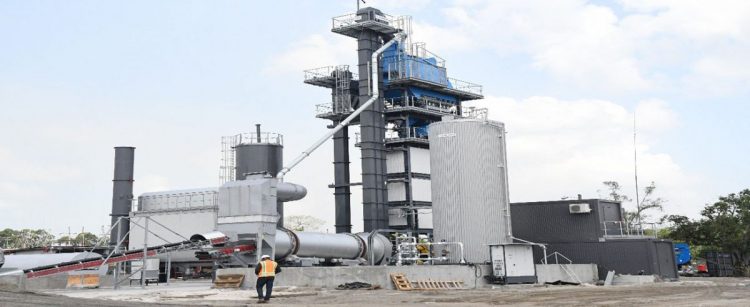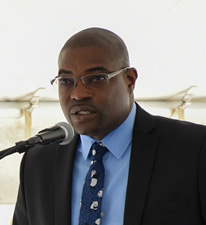Former Minister of Public Infrastructure, David Patterson yesterday said that the Demerara Harbour Bridge’s (DHB) Asphalt plant is “fully functional”.
In a Facebook post he was responding to reports in the local media that the plant which was assembled last year was not functional.
Patterson also raised a number of queries about a recent audit of the asphalt plant that was commissioned by the current PPP/C government and released last week.

While not included in the report of the audit team headed by Chateram Ramdihal, Patterson said that articles about the new asphalt plant not being operational are not true.
“I have been reliably informed that the plant is fully functional, however, the authors of these articles have a different agenda”, he said.
The Eco 2000 Batch Mix Asphalt Plant will be able to produce 160 tonnes of material per hour. The plant arrived in July 2019 and assembly began last year.
Patterson said he had been following the finding of the special audit on the DHB Asphalt Plant and had decided to offer a few comments.
He noted that the report was commissioned to examine the functioning of the Asphalt Plant during the years 2013 – 2020 but “not surprisingly” the team found no records for 2013 & 2014. These two years would have been under the PPP/C administration.
Patterson said that the Board members of 2013 – 2014 are a matter of public record but there is no evidence that the audit team contacted these members to ascertain why no records were available during their tenure
He pointed out that the Institute of Chartered Accountants had been requested to submit a representative to sit on the DHB board in 2015. He said that their nominee “should be given kudos for instituting and implementing systems from scratch. Acknowledging as the report stated, that the systems could be strengthened, no reference was made that this was a work in progress, starting from zero to the time of the Audit”.
Patterson, who is now the chair of the Public Accounts Committee of Parliament, noted that the DHB is audited every year and the report laid in the Parliament. He said that the auditing firm is appointed by the Auditor General of Guyana but that none of the issues raised by the Ramdihal probe were highlighted in the publicly available financial reports which would have served as a red flag to the Board, Management and Ministry. He noted that the Ramdihal team offered no comments on the completeness of the Auditor General-commissioned reports.
Cold mix
The Ramdihal report had also said that the DHB asphalt plant began selling cold mix and the decision to do so was not in keeping with the company’s policy and there had been no feasibility study on how profitable this move could be.
Patterson in reply to this said that cold mix asphalt has been around since the 1830s and has specific uses which would obviate the need for a feasibility study.
“…it has been used extensively worldwide since (the 1830s), it is as its name suggests … the alternative to hot mix (asphaltic concrete), it is used extensively as `a stitch in time saves nine’ solution particularly during the rainy season when most potholes develop. Simple usage – during the rainy season, if a pothole develops, the maintenance team applies the cold mix in the new pothole and seals the crack – if left untreated (as is happening now), the size and damage of the pothole increases. To suggest that a feasibility study is needed for a product that has been in use for almost 200 years is to say the least strange, even stranger still since it has been in use in Guyana long before 2015”, Patterson said.
Noting the Ramdihal report finding that the DHB management had advanced the plant’s funds to a cold mix company in Trinidad that was legally non-existent, Patterson said that the question on the procurement and payment to the supplier before the company was established would need to be addressed by the management and board.
“However, it would be interesting to find out (in) what name the cheque was issued since it is claimed that the company received the contract before it was registered. With the anti-money laundering laws, it is would be impossible to cash a cheque without a bank account, if it was written in a company’s name”, Patterson stated.
Referring to the finding that the DHB and the Asphalt Plant had purchased a bracelet worth nearly $900,000 for the General Manager (GM) Rawlston Adams that he himself approved, Patterson said that Adams has to provide a solid answer.
“On the gold band matter, management, in particular the GM, needs to provide a solid response to this issue, including the circumstances and decision-making process behind this procurement – knowing the team, I am confident a full and frank response is forthcoming, remember the maxim – `innocent until proven guilty’”.
Patterson noted that the DHB has been operational for over 40 years and the challenge to keep it afloat is widely known.
“The management and staff of DHB should be congratulated and encouraged for their efforts in ensuring that 18,000 vehicles and 20 ocean-going vessels access the bridge daily. If correctable mistakes have been made, they should be allowed to correct the same – it will be foolhardy to “throw out the baby with the bathwater”, but everyone already suspects where the baby will end up”, he added.
Although no substantial evidence emerged from the Ramdihal investigation into alleged financial misconduct at the Asphalt Plant, the probe team said that they found poor internal controls which need to be bolstered in order to prevent the multiple discrepancies that were unearthed.
Following allegations made in a Kaieteur News article, subject Minister Juan Edghill established a team to conduct investigations.
The investigative team, which consisted of Ramdihal – team leader; Heidi Gillette, Brion Singh, and Dexter Smith, was appointed on October 5th. They were also tasked with examining the systems at the Plant, finding out its reliability and weaknesses which would allow for malpractices to be capitalized on, determining culpability and the appropriate penalty to be meted out to those involved and provide recommendations on a way forward.
After giving a brief summary of the report on Wednesday, Ramdihal stated that they had not found substantial evidence to prove that the allegations that triggered the investigation are true.





